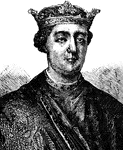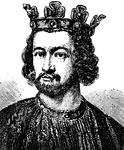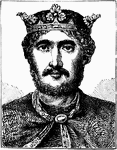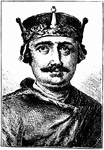Clipart tagged: ‘king england’

Henry II
Henry II of England (5 March 1133 – 6 July 1189) ruled as King of England (1154–1189). Henry…

King John
John (24 December 1167 – 19 October 1216) reigned as King of England from 6 April 1199, until…

Richard I
Richard I (8 September 1157 – 6 April 1199) was King of England from 6 July 1189 until his death.…

Richard II
Richard II (6 January 1367 – ca. 14 February 1400) was King of England from 1377 until he was…

William Rufus
William II (c. 1056 – 2 August 1100), the third son of William I of England (William the Conqueror),…